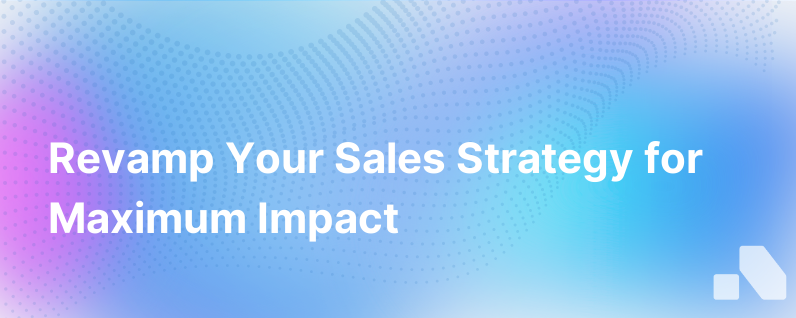
In today's marketplace, where B2B transactions are becoming increasingly complex and competitive, fine-tuning your sales strategy is not just important—it's critical for survival and growth. An efficient sales strategy propels a B2B organization toward sustained success by fostering customer relationships, shortening sales cycles, and achieving a better return on investment.
The Foundation of Proactivity: Data Analytics and AI
A progressive sales strategy leans heavily on data analytics and artificial intelligence (AI) to anticipate market trends, understand customer behaviors, and drive decision-making. Utilizing data analytics mitigates the risk of relying on intuition, while AI can provide actionable insights and free your salesforce from manual tasks, increasing their productivity.
Leveraging machine learning models, you can predict which prospects are most likely to convert, what products existing customers may need next, and which leads require immediate attention based on their engagement. Data analytics also aid in identifying the most profitable market segments, understanding customer churn, and optimizing product pricing strategies.
Personalizing for Performance: The 1:1 Approach
The generic approach to B2B selling is largely obsolete. In a world where personalization is king, account-based marketing (ABM) strategies target high-value accounts with highly personalized engagement plans. ABM necessitates a deep dive into your prospective client's business, aligning your solutions directly with their strategic goals, and positioning your offering as essential for their success.
Humanizing the Process: Emotional Intelligence
Artificial intelligence is just one piece of the puzzle. The emotional intelligence (EQ) of your sales force is equally significant. A salesperson with high EQ is adept at navigating complex customer relations, managing their own emotions, recognizing emotional cues from customers, and influencing decision-makers. Incorporate EQ training into your sales development programs to craft a team that's as emotionally astute as they are sales-savvy.
Relationships Above Transactions: Building Value
In B2B sales, relationships trump transactions. Cultivating meaningful relationships can lead to larger deals, longer-term contracts, and more consistent renewals. This approach goes beyond knowing your client's business; it's about becoming a trusted advisor who your client can depend on for insightful consulting, not just products or services. It suggests a shift from a seller-centric to a buyer-centric sales methodology.
Tailoring the Technologies: CRM and Automation Tools
Opting the right Customer Relationship Management (CRM) system allows businesses to streamline their sales processes, manage contacts effectively, create a sales pipeline, automate mundane tasks, and personalize customer interactions. HubSpot and Salesforce, among other CRM platforms, offer these capabilities, which can be transformative once fully leveraged. Advanced analytics integrated into these platforms can also provide granular insights into sales performance and customer engagement patterns.
Alignment and Adaptation: Sales Methodology
A defined and adaptable sales methodology is essential. Whether it's Challenger, SPIN Selling, Sandler, or another method, having a consistent approach ensures your team is on the same page and can effectively measure what works and what doesn't. However, the method should not be set in stone but should adapt to the evolving market and customer preferences.
Insight Over Assumption: Customer Feedback
Understanding customers doesn't stop at the sale. Continuous feedback loops help you tweak your sales strategy and adjust your product roadmap. Use customer feedback to improve and innovate, ensuring that your solution continues to meet and exceed market needs.
Sales Enablement: Empowerment is Key
A successful B2B sales strategy ensures that sales reps are well-equipped with contemporary sales enablement tools. Sales enablement encompasses content, tools, knowledge, and information that sales representatives can utilize to increase efficiency. It's about empowering your reps to deliver the right message, at the right time, via the right channel.
A Shared Vision: Marketing-Sales Alignment
No sales strategy is complete without alignment between sales and marketing. Both departments must work in tandem, sharing insights and coordinating on campaigns, content, and communications. The united front not only presents a cohesive brand image but also ensures that efforts are not duplicated and opportunities for synergy are maximized.
Conclusion
An improved B2B sales strategy isn't just about better sales technology or smarter analytics; it's about integrating emotional intelligence, building value-laden relationships, aligning sales methodologies to customer needs, and empowering the sales force with the right tools. With these strategies in place, a startup or established enterprise can propel its sales team toward greater success.
Incorporating these improvements requires a deep understanding of not just your own business but also the evolving landscape of B2B sales. Established platforms like Aomni can offer resources and tools to elevate your sales approach, ensuring your strategies don't just respond to the present but are proactive toward future trends and shifts. By adopting these solutions, businesses can ensure their sales strategies are as intelligent, dynamic, and customer-focused as the markets they serve.
Sources:
- Unlocking the power of data in sales
- Why Sales Data Analysis Is Crucial to Better Decision Making
- 10 Sales training techniques every manager should know
- How To Set Effective Sales Goals (With 5 Examples) 2024
- 5 key reasons why data analytics is important to business
- 9 Sales Weaknesses That Cripple a Sales Rep's Ability to Qualify
- 9 Sales Goals for Reps to Help them Achieve
- Train Your Sales Team: 8 Most Effective Techniques | Funnel Clarity